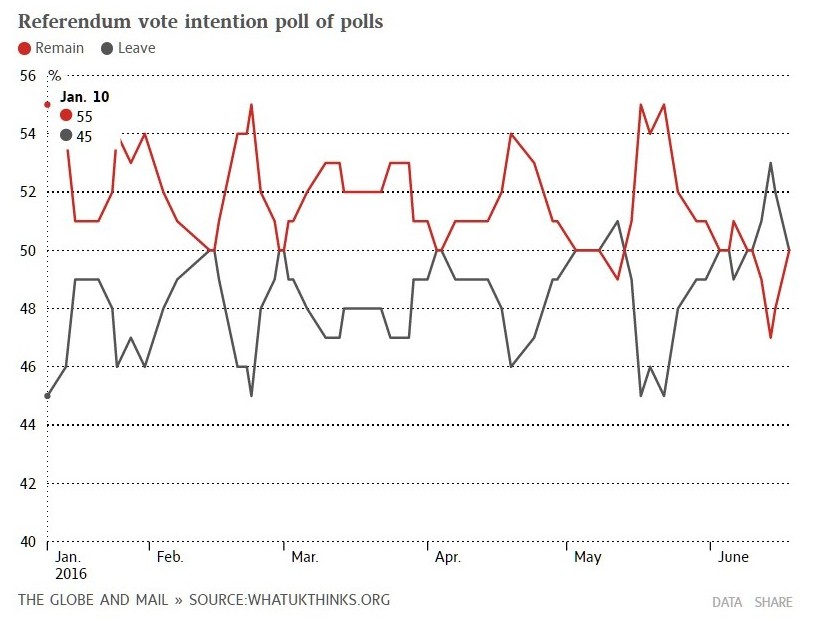On June 23 people in the United Kingdom will be asked to vote on a simple question:
Should the United Kingdom remain a member of the European Union or leave the European Union?
What do the polls say?
For weeks, Remain held a slight lead, then Leave pulled ahead last week and now the race is about evenly split, based on a comprehensive poll of polls.
Why now?
To quell growing dissention within the Tory party and the rise in popularity of the Euro skeptic United Kingdom Independence Party, UKIP, Prime Minister David Cameron promised in 2013 to hold a referendum on the EU if his party won the election in 2015.
They did and he called the vote.
What’s the background:
Britain has been a member of the EU, and its predecessor, since a referendum in 1975, when 67 per cent of Britons voted to join what was then called the European Economic Community.
That evolved into the EU in 1993. British governments, particularly those led by Tories, have balked at what they see as the transformation of the EU into a political union and the country has opted out of several EU programs including the euro.
What is the EU?
The EU has 28 member states that sends members to the European parliament and abide by the European Court of Justice among other institutions. It has its own currency, the euro, used by 19 members; a parliament; central bank; court of justice; a flag.
Many members of the EU also belong to the euro zone and/or the Schengen Area.
The euro zone is a group of 19 EU states that use the euro and fall under the European Central Bank.
The Schengen Area is named after the town in Luxembourg, where the agreement was signed in 1985. It provides the passport-free movement of people.
Of the EU states, 26 belong to Schengen in one way or another. Three other non-EU countries, Iceland, Norway and Switzerland, are associated members. Britain and Ireland do not belong.
MURAT YUKSELIR FOR THE GLOBE AND MAIL
What it means for Canada and the markets
If Britain leaves the EU, the Comprehensive Economic and Trade Agreement, known as CETA, could be in trouble. That agreement has already been seven years in the works and has yet to be ratified by the EU or its member states. Brexit would probably distract the EU for years and put CETA on hold even longer.
The Bank of England has warned that the fallout from a British vote to leave the EU could harm the global economy. Bank of England governor Mark Carney has suggested that Britain could face a recession if it pulled out of the EU. And last week, something akin to panic set in across European financial markets, with investors piling into sovereign bonds, seeking a haven from the turmoil. In Canada, a Brexit could also further fan the flames in Canada’s overheated housing market.
A Brexit would like also cause big headaches for Canadian companies. Canadian firms choose to do business in Britain because it’s a “beachhead” to launch into the EU but still shares a language and similar laws with Canada.
One thing is clear: The debate about Britain’s potential departure also recalls when Quebeckers voted twice in referendums in which hard economics yielded to emotion and nearly broke up Canada, The Globe and Mail’s Jeffrey Simpson writes.
The Globe and Mail



